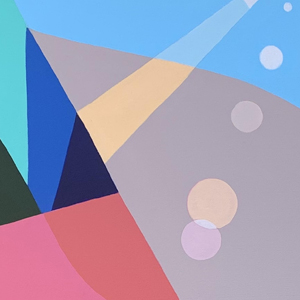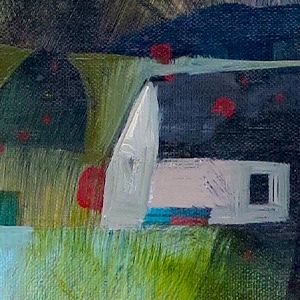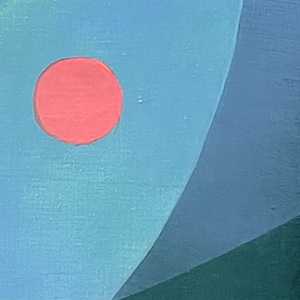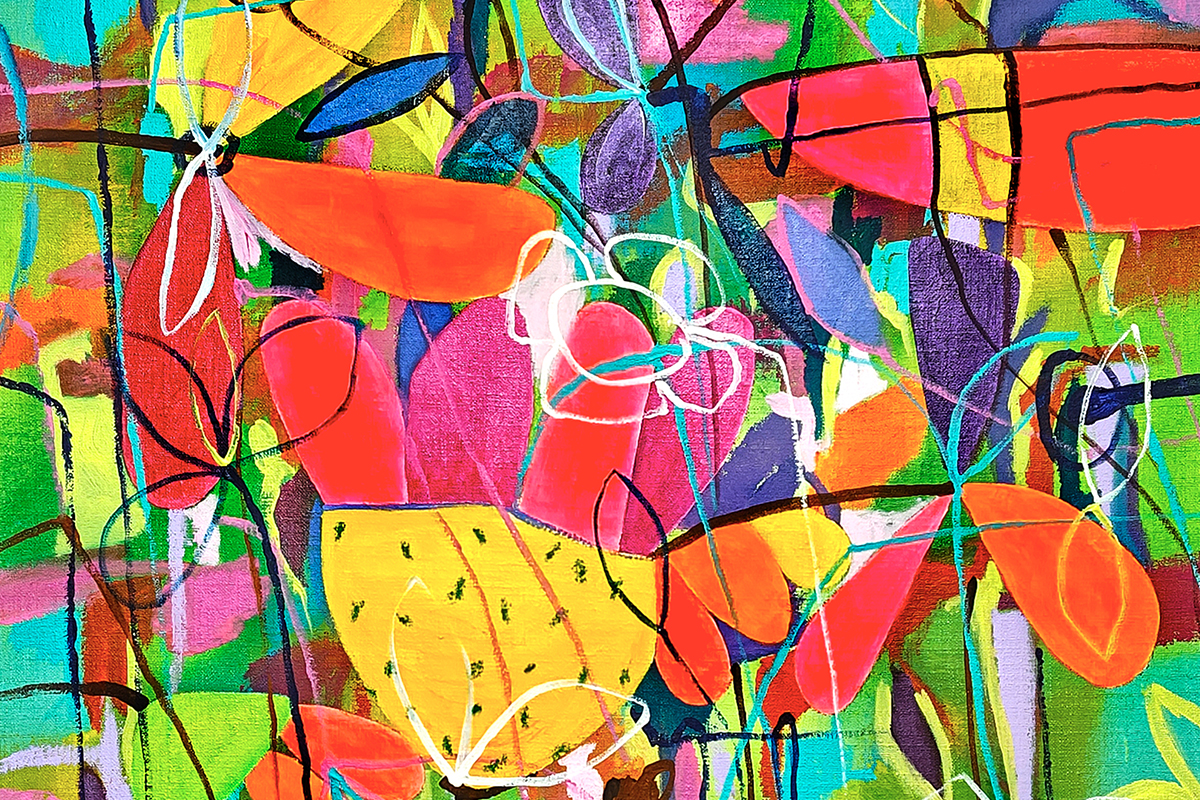
Interlude: Meaningful Employment
What Makes Your Work Meaningful?
Artwork: “The Winds of Spring” by Agucho Velásquez © 2024
“Wonder is not incidental to a life worth working—it is foundational. It demands courage, humility, and a sustained willingness to enter into spaces of discomfort where easy answers are unavailable. Wonder reframes discomfort not as something to be avoided, but as something to be mined for meaning, connection, and growth.” —Michelle Weise
We asked people from a variety of professions and backgrounds what makes their work meaningful, and while the nature of their jobs and the content of their responses varied, we were struck by a common thread of love and commitment to the good of others. Perhaps there is a common vocation, or a foundational motivation, that transforms work into more than a job.
Rana Awdish
Physician, Henry Ford Hospital
I was trained in a biomedical model that taught me to view the body as a machine with broken parts I was meant to fix. In that model, the patient became an object, stripped of agency. I’ve come to understand that healing is not something one person confers upon another. It emerges in relationship, co-created with the body’s own wisdom.
Because of this shift, my work feels most meaningful when I help others, from patients to fellow physicians, reconnect to their own strength and motivation, even in moments of deep vulnerability. Healing happens when we meet each other as humans. Humans who are flawed, aware of their own fragility, and attuned to shared suffering. It is not just physical; it is embodied, relational, and alive.
To practice this way, I must bring my whole self. My medical knowledge matters, but so does my lived experience, my vulnerability, and my willingness to be present. Illness often strips people of agency, identity, and control. We can help rebuild those foundations through our presence and support.
I want us to see the full personhood of our patients, and to understand that medicine lives not only in interventions but in presence, perception, and in the spaces between us. That is where true healing begins.
 Rana Awdish, MD, is a pulmonary and critical care physician serving as the Director of the Pulmonary Hypertension Program at Henry Ford Hospital. She also serves as the Medical Director of Care Experience for Henry Ford’s Health System, where she has integrated compassionate communication strategies and Narrative Medicine practice into the curriculum. She is the author of In Shock, a critically acclaimed, bestselling memoir based on her own critical illness.
Rana Awdish, MD, is a pulmonary and critical care physician serving as the Director of the Pulmonary Hypertension Program at Henry Ford Hospital. She also serves as the Medical Director of Care Experience for Henry Ford’s Health System, where she has integrated compassionate communication strategies and Narrative Medicine practice into the curriculum. She is the author of In Shock, a critically acclaimed, bestselling memoir based on her own critical illness.
Angela Hubbard
Custodian, University of Notre Dame
To me, it’s waking up every morning, thanking God for another day’s journey to be able to come to work knowing I have a purpose and a job to do, all the while making sure the employees and students are coming into a well-cleaned and organized building.
What’s more meaningful is the smiles a person or student can put on my face just by appreciating the small things, things that are not required in my job description, that I go out of my way to do for them.
I have worked at the University of Notre Dame for 35 years, over 20 of them in a girls’ dorm. Not too long ago, a lady came into Geddes Hall (where I now work). She was heading to the 3rd floor. When she came back down, she recognized me from working in the dorm she used to live in, noting how helpful I was to her and her roommates, cleaning their private bathroom. For this young lady to tell me this after she graduated 15 years ago, now that is meaningful work to me. I love what I do. I love to help others in any way that I can, big or small. It’s always a team effort with me.

Angela Hubbard began her Notre Dame career in 1990 working as a line server at North Dining Hall. Four years later she was transferred to the Building Services Support team as a Custodian. She worked in a number of residence halls until she was recommended to Breen-Phillips Hall, where she remained for over 20 years. She then decided it was time for a change and moved to Geddes Hall, where she has been ever since.
Guru Madhavan
Norman R. Augustine Senior Scholar and Senior Director of Programs, National Academy of Engineering
What happens when a system you trust fails? An instrument falters. A model collapses. A decision meant to help backfires. Meaningful work cracks you open, like a geode revealing its crystalline core, to uncover the potential of what you can build and who you can become.
In engineering, true productivity springs from insight. We build, we break, we begin anew. Claude Claremont wrote, “The engineer learns most on the scrapheap,” where lessons rise from the rusted, the discarded, the unfinished. Each misstep reveals context and consequence, refining the work and the worker.
My most transformative moments stemmed from quiet failures. I nearly failed control theory, yet it became the lens through which I think in systems. My GRE verbal score was dismal, but later nudged me toward writing. Reclaimed from the scrapheap, these stumbles reshaped my potential, opening paths I hadn’t envisioned.
Across my work in medical products, systems analysis, and technology and workforce policy, one question persists: Who will this touch, and how carefully can we account for them? Here, productivity and purpose converge.
Every system we craft reaches beyond our hands. Others inherit our creations, navigating their promise and perils. Meaning in engineering lies in the audacity of returning to the flawed, the unresolved, seeing clearly what it demands, and engaging it again, and again. This relentless, revealing, regenerative rhythm, like steel forged in the scrapheap’s fire, sustains the practice and sharpens its purpose.
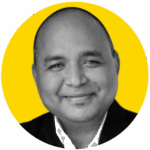
Guru Madhavan is the Norman R. Augustine Senior Scholar and senior director of programs at the National Academy of Engineering. He is the author of Applied Minds: How Engineers Think and Wicked Problems: How to Engineer a Better World.
Maria F. Vazquez
Superintendent, Orange County Public Schools (Florida)
I was terrified on the day I started kindergarten. I didn’t speak a word of English, and I feared that no one would understand me. My parents fled Cuba for Florida before I was born, and they saw education as the key to success in America. As scared as I was at first, I found a sanctuary in school. My kindergarten teacher, Ms. Alvarez, ensured I was around students who could translate, and she consistently checked in to make sure I wasn’t left behind. Over the years, teachers saw my potential and pushed me. Because of my experience in school, I see myself in every student, regardless of their challenges. Reaching a struggling reader or getting to a breakthrough on a tough concept is immensely rewarding. And now I get to help make sure these moments happen for more than 200,000 students each year.
Our district is urban, suburban and rural and serves students from 199 countries who speak 176 languages and dialects. We need to make sure our schools provide each child with an individualized pathway. We offer a range of advanced studies options, more than 40 magnet programs, provide alternative education programs that combine work and learning, and maintain a network of career and technical colleges. But we’re always looking for ways to do more. Public education serves as the great equalizer. It provides every child, regardless of their background or circumstances, with the opportunity to learn, grow, and succeed. So we can’t slow down.
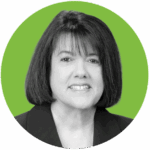
Maria Vazquez has served at every level of the education system and has extensive expertise in curriculum and instruction. In 2022, she became Superintendent of Orange County Public Schools. During her tenure, she has expanded access to advanced coursework for historically underserved students, recruited great teachers to the most vulnerable schools, and reprioritized the district’s budget to support teaching and learning. Under her leadership, OCPS earned an “A” grade from the Florida Department of Education.
Jason Wesaw
Educator and Multi-disciplinary Artist,
Potawatomi (Turtle Clan)
My work is meaningful because it’s created from a place of Love. I believe we’re each given a unique set of skills, tools of a sort, with which to shape and refine the reasons for our existence. The language of visual art is an incredibly powerful instrument that I have in my toolbox. I want to be a conduit for a higher power, one who reminds me that we are deeply spiritual beings, living a very interconnected and often flawed human experience. While creating with paper and clay, I am constantly inspired by the enduring relationships we have with the lands, waters, and skies around us. The natural world teaches us so much about nurturing and reciprocity, which can guide us in how we thoughtfully interact with other people. The earth provides inspiration to draw or sculpt in a way that decentralizes the self and opens us up to truly understanding our place amongst all of creation. When we acknowledge our role in this circle, it makes accepting others unlike us quite easy. I happen to feel this is one of the most important issues that we need to overcome in modern times: How do we better Love and accept those who may look different, have diverse beliefs, or live in a separate part of the world than us? I desire for my art to remind the viewers of the importance of healthy and respectful communication, as it shows the capacity we have to care for and Love one another.
 Jason Wesaw is an educator and multi-disciplinary artist, exhibiting works in an array of media including ceramics, textiles, works on paper, and traditional cultural pieces. His projects relate stories about the Potawatomi people’s ancient and evolving connection to the Land, the Sky, the Water, and Beyond. He is dedicated to working in his Tribal community as a Peacemaker and believes strongly in the healing, empowering qualities of relationship-building through the timeless, traditional teachings of his ancestors. Jason is Potawatomi (Turtle Clan) and lives near the historic Pokagon Potawatomi settlement of Rush Lake in southwestern Michigan.
Jason Wesaw is an educator and multi-disciplinary artist, exhibiting works in an array of media including ceramics, textiles, works on paper, and traditional cultural pieces. His projects relate stories about the Potawatomi people’s ancient and evolving connection to the Land, the Sky, the Water, and Beyond. He is dedicated to working in his Tribal community as a Peacemaker and believes strongly in the healing, empowering qualities of relationship-building through the timeless, traditional teachings of his ancestors. Jason is Potawatomi (Turtle Clan) and lives near the historic Pokagon Potawatomi settlement of Rush Lake in southwestern Michigan.
Fall 2025
Part I: Employing Virtue
Chris Higgins
Anna Bonta Moreland
Karen E. Bohlin
Zena Hitz
Interlude: Meaningful Employment
Michelle Weise
Part II: Employing Vocation
MORE









